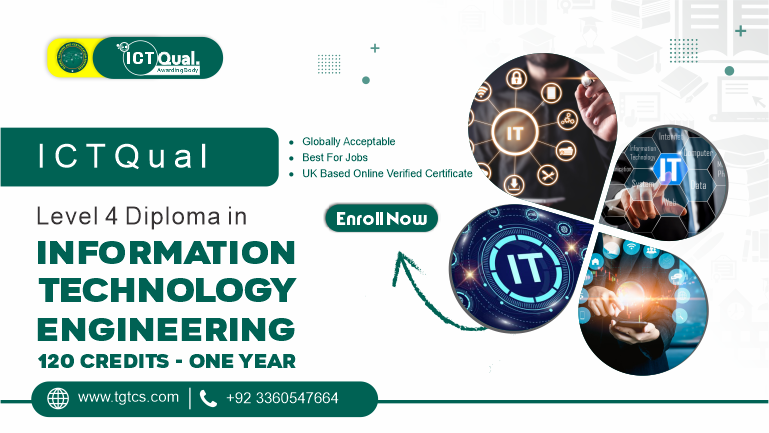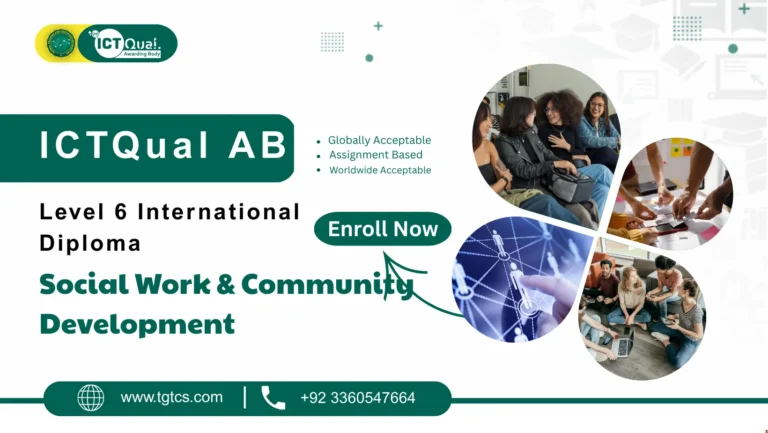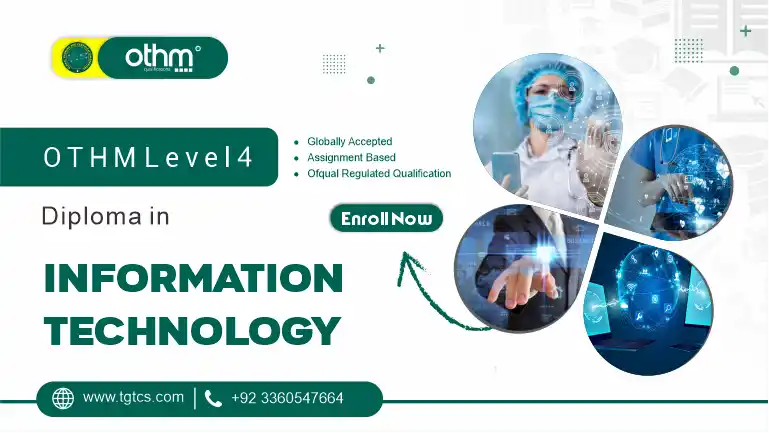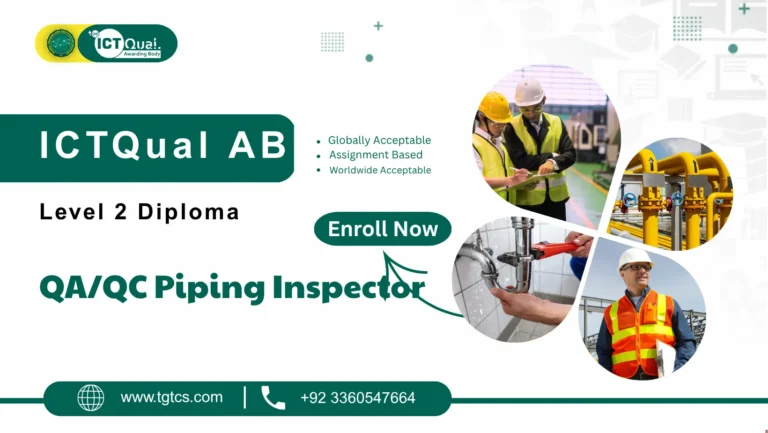ICTQual Level 4 Diploma in Information Technology Engineering 120 Credits – One Year
The ICTQual Level 4 Diploma in Information Technology Engineering is a comprehensive one-year qualification designed to equip students with the essential knowledge and skills needed to thrive in the rapidly evolving field of IT. With 120 credits, this diploma provides an in-depth understanding of IT engineering, ensuring that graduates are well-prepared for the challenges of modern technology environments. Whether you’re looking to advance your career or start a new path in IT, this course offers the foundational expertise needed to succeed.
The ICTQual Level 4 Diploma in Information Technology Engineering is an accredited qualification that covers a wide range of technical and practical skills. Over the course of one year, students will learn to solve complex IT engineering problems, design, and maintain IT systems, and apply their skills to meet the technological needs of businesses and organizations.
This diploma is structured to provide students with the knowledge required to support the IT infrastructure of various industries, including software development, network management, cybersecurity, and IT system design. The course is ideal for individuals seeking to establish a career in the IT sector or for those looking to enhance their existing skills to move into more advanced roles.
The ICTQual Level 4 Diploma in Information Technology Engineering is a one-year, 120-credit qualification that prepares graduates for a successful career in the dynamic and growing field of IT. With a strong focus on practical skills and real-world applications, this diploma equips students with the expertise needed to excel in roles such as IT systems engineer, network engineer, cyber security specialist, and more. Whether you’re starting your IT career or looking to advance, this course is your gateway to success in the IT industry.
The Global Training and Certification Services (TGTCS) is Directly Approved Training Centre of ICTQual
The ICTQual Level 4 Diploma in Information Technology Engineering is a comprehensive one-year qualification that provides students with essential knowledge and practical skills to succeed in the fast-paced IT industry. This 120-credit diploma covers key areas such as IT system design, network management, cybersecurity, cloud computing, database administration, and IT project management. Graduates will gain the expertise needed to tackle complex IT challenges and implement effective solutions in various sectors.
Designed for individuals looking to pursue a career or advance in IT engineering, this course offers a strong foundation in technical skills and industry-relevant knowledge. Upon completion, students will be prepared for a wide range of roles, including IT systems engineer, network engineer, cybersecurity specialist, and cloud engineer, with excellent career prospects in the growing IT sector.
Mandatory Units
The Units of Level 4 Diploma in Information Technology Engineering 120 Credits – One Year are as ;
- Fundamentals of IT Engineering
- Network Management and Administration
- Cybersecurity and Data Protection
- Systems Design and Software Development
- Database Management and Development
- Cloud Computing and Virtualization
- Advanced Network Security
- IT Project Management
- IT Infrastructure and Systems Management
- Business IT Solutions
- Emerging Technologies in IT
- Professional Practice in IT Engineering
Here are the learning outcomes for each study unit in the ICTQual Level 4 Diploma in Information Technology Engineering program:
- Fundamentals of IT Engineering
- Understand key IT engineering concepts, including hardware, software, and network systems.
- Apply foundational IT infrastructure knowledge to design and maintain basic systems.
- Analyze the roles and functions of various IT components within an organization.
- Network Management and Administration
- Design, implement, and troubleshoot network systems and configurations.
- Apply principles of IP addressing, routing, and network security to ensure the efficient operation of IT networks.
- Manage and monitor network performance and connectivity using appropriate tools and techniques.
- Cybersecurity and Data Protection
- Identify and assess cybersecurity threats and vulnerabilities in IT systems.
- Implement data protection strategies, including encryption, firewalls, and access control protocols.
- Understand legal and ethical considerations in managing digital security.
- Systems Design and Software Development
- Apply systems analysis and design techniques to develop IT solutions that meet business requirements.
- Use programming languages to develop functional software applications and systems.
- Evaluate software development methodologies and select appropriate techniques for system design and deployment.
- Database Management and Development
- Design, implement, and manage relational databases for efficient data storage and retrieval.
- Develop SQL queries for database management and reporting.
- Apply database normalization principles to ensure data consistency and integrity.
- Cloud Computing and Virtualization
- Analyze cloud computing concepts, including cloud architecture, storage solutions, and virtual environments.
- Implement cloud-based solutions to optimize IT infrastructure.
- Configure and manage virtual machines and virtualized environments for business applications.
- Advanced Network Security
- Evaluate and implement advanced security measures to protect networks from external and internal threats.
- Use intrusion detection systems (IDS) and other security tools to monitor and mitigate network vulnerabilities.
- Apply secure communication protocols and encryption techniques to ensure data integrity and privacy.
- IT Project Management
- Apply project management methodologies to plan, execute, and monitor IT engineering projects.
- Manage project risks, timelines, and budgets while ensuring high-quality delivery.
- Communicate effectively with stakeholders to ensure project goals are met within scope and budget.
- IT Infrastructure and Systems Management
- Administer and maintain IT infrastructure, including servers, operating systems, and networking components.
- Perform regular system updates, backups, and troubleshooting to ensure the reliability and security of IT systems.
- Evaluate system performance and optimize infrastructure to meet organizational needs.
- Business IT Solutions
- Evaluate business needs and propose IT solutions to improve operational efficiency.
- Implement enterprise resource planning (ERP), customer relationship management (CRM), and business intelligence (BI) systems.
- Analyze the impact of business IT solutions on organizational processes and performance.
- Emerging Technologies in IT
- Investigate emerging technologies such as artificial intelligence (AI), the Internet of Things (IoT), and blockchain.
- Assess the potential applications and impact of these technologies on IT systems and business operations.
- Develop strategies to integrate emerging technologies into existing IT infrastructures.
- Professional Practice in IT Engineering
- Demonstrate professional behavior in the IT workplace, including teamwork, communication, and problem-solving.
- Apply ethical and legal standards in IT engineering practices.
- Reflect on personal development and plan future learning goals for continuous professional growth in the IT sector.
The ICTQual Level 4 Diploma in Information Technology Engineering offers numerous benefits for individuals aiming to advance their career in the rapidly evolving IT sector. Here are the key benefits of this course:
- Comprehensive IT Knowledge
The course provides a solid foundation in core IT engineering disciplines, including network management, cybersecurity, systems design, database development, cloud computing, and more. It equips students with the skills to tackle a wide range of IT challenges and provides a thorough understanding of the technical concepts that drive the industry. - Industry-Relevant Skills
Students will gain practical skills that are directly applicable to real-world IT scenarios. This includes system administration, network configuration, cloud solutions, cybersecurity, and IT project management. Graduates will be well-prepared to manage and troubleshoot complex IT infrastructures and contribute to technology-driven business solutions. - High Demand in the Job Market
The IT engineering field continues to grow, with increasing demand for skilled professionals. By completing this diploma, graduates will have the knowledge and skills that are highly sought after by employers across various industries, including tech companies, government agencies, and large corporations. - Career Advancement Opportunities
With the practical and theoretical knowledge gained from this course, graduates are equipped for roles such as IT systems engineer, network engineer, cybersecurity specialist, cloud engineer, and database administrator. The diploma opens the door to career progression in high-paying and rewarding IT roles. - Pathways to Further Education
For those wishing to deepen their expertise, the ICTQual Level 4 Diploma provides a pathway to further education. Graduates can pursue higher education opportunities, such as a Bachelor’s or Master’s degree in IT, engineering, or related fields, which can lead to more advanced career prospects. - Focus on Emerging Technologies
The course covers emerging technologies such as artificial intelligence (AI), the Internet of Things (IoT), and blockchain, preparing students to work with cutting-edge technologies that are shaping the future of the IT industry. This knowledge makes graduates highly adaptable and valuable in a rapidly changing job market. - Project Management Skills
Students will learn to apply project management methodologies to plan, execute, and manage IT projects. This is essential for those wishing to take on leadership roles or manage large-scale IT initiatives, enhancing their overall employability. - Practical Experience
The course emphasizes practical application and hands-on learning, providing students with the opportunity to work on real-world projects and case studies. This prepares graduates to enter the workforce with the experience needed to succeed in their careers. - Enhanced Problem-Solving and Analytical Skills
By working through complex IT engineering scenarios, students will develop critical thinking, problem-solving, and analytical skills. These abilities are essential for troubleshooting, optimizing systems, and developing innovative solutions in the IT industry. - Professional Recognition and Accreditation
Upon completion of the diploma, graduates will have the credentials recognized by employers in the IT industry. The qualification is a great way to demonstrate competence in IT engineering, which can enhance employability and help individuals stand out in the competitive job market. - Flexibility and Career Variety
IT engineers have a wide range of career options available to them. Graduates of this course can work in sectors such as healthcare, finance, telecommunications, education, and more, ensuring job flexibility and opportunities for professional growth. - Ethical and Legal Awareness
The course emphasizes the importance of ethical and legal standards in IT engineering. Students will gain an understanding of data protection, cybersecurity laws, and professional ethics, preparing them to navigate complex legal and ethical challenges in the workplace.
Overall, the ICTQual Level 4 Diploma in Information Technology Engineering is a valuable qualification that prepares students for a successful career in IT, offering them a combination of theoretical knowledge and practical skills to thrive in the fast-paced digital world.
The ICTQual Level 4 Diploma in Information Technology Engineering is ideal for individuals who are passionate about technology and want to build a solid foundation in IT engineering. The ideal learner for this course typically has the following characteristics:
- Aspiring IT Professionals
This course is perfect for individuals who wish to start or advance their careers in IT engineering, network administration, cybersecurity, systems design, and related fields. If you are interested in working with technology to solve real-world problems, this diploma provides the skills and knowledge needed to excel. - Technical Enthusiasts
The ideal learner is someone who has a strong interest in technology, computer systems, and networks. Whether you’re fascinated by the inner workings of IT systems, cloud computing, or emerging technologies such as AI and blockchain, this course will help you develop expertise in these areas. - Problem-Solvers and Critical Thinkers
This diploma requires learners who are analytical, detail-oriented, and adept at troubleshooting complex issues. If you enjoy solving problems, thinking critically, and finding solutions to challenges, this course will allow you to apply those skills in the IT domain. - Career Changers
If you are currently working in a different field but wish to transition into IT engineering, this course provides the foundational knowledge and practical skills needed to enter the IT industry. Prior experience in technology or engineering is helpful but not mandatory, as the course covers both basic and advanced IT concepts. - Recent Graduates or School Leavers
The course is well-suited for school leavers or recent graduates who have a basic understanding of computer science or technology and want to pursue a structured qualification in IT engineering. This diploma is an excellent stepping stone to enter the workforce with a recognized qualification. - Those Looking for Career Advancement
Individuals already working in the IT field who want to upskill, specialize in specific areas such as network security, cloud computing, or database management, or take on more advanced roles will benefit from this qualification. It is ideal for those aiming for managerial positions or senior technical roles. - Individuals with Strong Communication Skills
As the course also covers IT project management and teamwork, the ideal learner should possess strong communication skills. The ability to work effectively with colleagues, clients, and stakeholders is essential for success in IT engineering roles. - Those Interested in Emerging Technologies
Learners who want to stay ahead of the curve in the rapidly evolving tech industry will find this course particularly appealing. It includes modules on cutting-edge technologies like AI, IoT, and blockchain, making it a great choice for tech enthusiasts eager to work with the latest innovations. - Self-Motivated and Goal-Oriented Learners
The ICTQual Level 4 Diploma is designed to challenge learners and help them grow into highly competent IT professionals. The ideal learner is self-driven, motivated to learn, and committed to completing the course to gain the expertise required for a successful career in IT engineering. - Students with an Interest in IT Project Management
For those interested in taking on leadership roles within the IT field, this course offers insights into project management, including risk management, team coordination, and effective communication, preparing learners to handle large IT projects.
In summary, the ideal learner for the ICTQual Level 4 Diploma in Information Technology Engineering is someone with a strong interest in IT, a desire to solve technical challenges, and a commitment to gaining practical skills that will help them succeed in a wide range of IT careers. Whether you are just starting your career or looking to enhance your skills, this qualification offers the tools to help you succeed in the ever-evolving tech industry.
Upon completing the ICTQual Level 4 Diploma in Information Technology Engineering, graduates have a variety of options for further development and career advancement. The knowledge and skills gained throughout this one-year program create numerous opportunities for progression in both education and employment. Here are some potential pathways:
1. Higher-Level Qualifications
- ICTQual Level 5 Diploma in Information Technology Engineering: This diploma is an ideal next step for those looking to enhance their expertise in IT engineering. It provides deeper knowledge in advanced IT concepts, preparing students for higher-level roles such as IT managers and strategic leaders in the technology industry.
2. Industry Certifications
- Cisco Certified Network Associate (CCNA): For those interested in network management and security, the CCNA certification adds value by providing practical expertise in networking technologies and security protocols.
- Certified Information Systems Security Professional (CISSP): Graduates passionate about cybersecurity can pursue the CISSP certification, which specializes in security management, risk assessment, and ensuring organizational security.
- Microsoft Certified: Azure Fundamentals: For learners focused on cloud computing and virtualization, this certification provides essential knowledge in cloud infrastructure and services, making it an excellent option for those looking to specialize in cloud technology.
3. Employment Opportunities
The ICTQual Level 4 Diploma prepares graduates for various roles in the IT sector. Some potential job titles include:
- Network Engineer: Responsible for designing, implementing, and maintaining network systems and infrastructure.
- Cybersecurity Analyst: Focuses on protecting systems and data from cyberattacks and ensuring organizational security.
- Database Administrator: Manages and maintains databases, ensuring efficient storage and data retrieval.
- IT Project Manager: Oversees IT projects, ensuring timely delivery, within budget, and according to specifications.
- Systems Administrator: Manages IT systems, servers, and infrastructure to ensure smooth and secure operations across organizations.
4. Entrepreneurship and Consulting
Graduates may also choose to start their own IT consultancy or business. With expertise in network management, cybersecurity, and cloud computing, they can offer services such as technical troubleshooting, system design, and IT consulting to help organizations optimize their operations.
5. Professional Development
Graduates are encouraged to pursue continuous professional development (CPD) to stay ahead in the rapidly evolving tech industry. Attending workshops, seminars, and industry conferences ensures that skills remain current. Additionally, memberships with organizations like the British Computer Society (BCS) or CompTIA offer valuable networking opportunities, resources, and industry recognition.
By completing the ICTQual Level 4 Diploma in Information Technology Engineering, students lay a solid foundation for a successful career in IT, with many opportunities to further enhance their expertise through further qualifications or certifications, advancing their professional journey in the tech industry.
Course Overview
Course Level
Level 4
Course Units
12 Mandatory Units
Duration
one year






